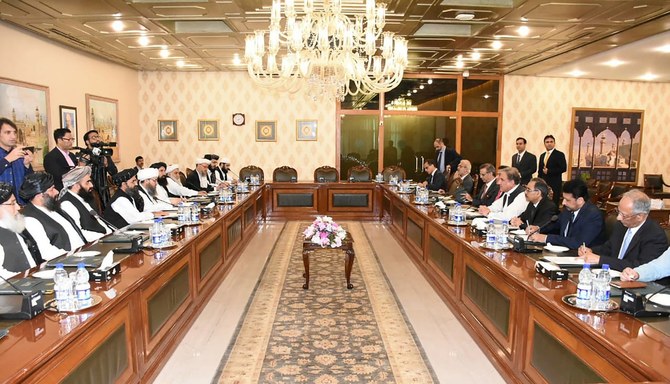ISLAMABAD: The Afghan Taliban high-level delegation arrived in Islamabad, on Monday, on the invitation of Pakistan’s Foreign Office, days after Pakistani authorities imposed on the group’s leadership sanctions, which include travel restrictions.
The sanction order issued on Aug. 18 and made public on Friday includes the name of Taliban chief peace negotiator Mullah Abdul Ghani Baradar.
“Officials of the Islamic Emirate routinely pay visits to regional and other countries of the world as part of our political strategy to convey our views about the peace process,” Taliban political spokesman Suhail Shaheen said in a Twitter post on Sunday.
According Taliban political spokesman Mullah Baradar is leading the delegation, which will hold meetings with senior officials and discuss the peace process in Afghanistan.
The Foreign Office’s spokesman confirmed to Arab News that Pakistan had invited the Taliban to discuss the peace process.
A Taliban source in Doha, where the group has its political office, told Arab News that other members of the delegation will be Khairullah Khairkhwa, Mohammad Nabi Omari, Shahbuddin Dilawar and Abdul Latif Mansoor.
The Taliban will land in Pakistan as its sanctions on them are already in place. The sanction order also prevents their entry into or transit through the country.
Earlier on Sunday, the group said the Pakistani government’s decision to sanction its leadership would affect intra-Afghan talks.
“These are not new sanctions, they were slapped on a number of members of the Islamic Emirate previously. But while we are now entering into intra-Afghan negotiations and there is a need for travel, so of course these embargoes or sanctions will hamper the peace process,” Shaheen told Arab News from Doha, Qatar.
The order published by the Foreign Office says the decision was in line with the relevant resolutions of the UN Security Council’s Taliban Sanctions Committee, which direct member countries “to apply travel restrictions, arms embargo and to freeze the funds and other financial resources of certain individuals and entities.”
Shaheen told Arab News that the Taliban have no Pakistani assets or bank accounts, and do not buy weapons from Pakistan.
The Pakistani government’s move has been seen as an attempt to avoid the country’s blacklisting by the Financial Action Task Force (FATF), which monitors money laundering and tracks activities of terrorist groups. FATF put Pakistan on its grey list last year.
However, the development comes at a time when the US, under its agreement with the Taliban that was signed in Doha on Feb. 29, should start consultations with the UN Security Council’s members to lift the sanctions against Taliban leaders.
The Doha agreement says that with the start of intra-Afghan negotiations, the US “will initiate an administrative review of current US sanctions and the rewards list against members of the Islamic Emirate of Afghanistan,” which is known as the Taliban, “with the goal of removing these sanctions by August 27, 2020.”
On Sunday evening, Afghan Foreign Ministry’s spokesman Gran Hewad said in a video post on Twitter that Pakistan’s sanctions on the Taliban leaders were an “important development.”
“The Foreign Ministry has taken note of it and is studying it and will share results with the people after evaluation,” he said.
















